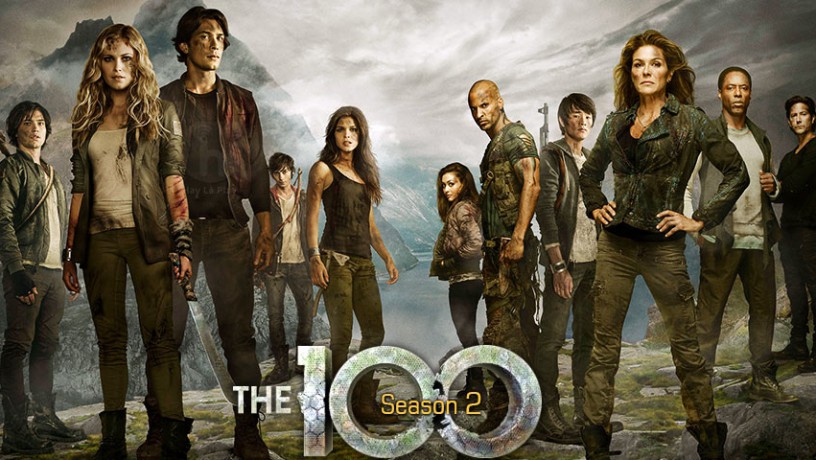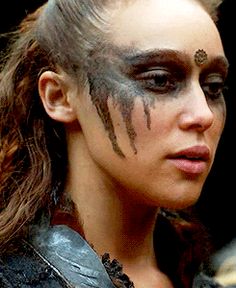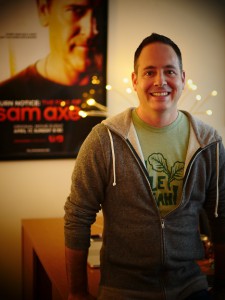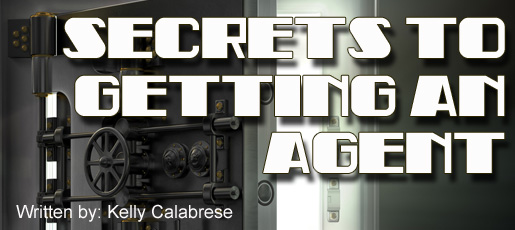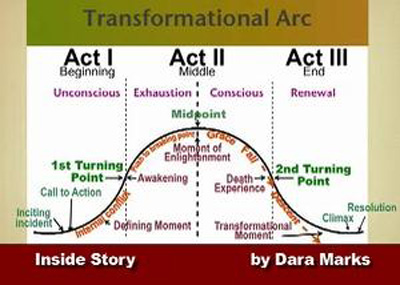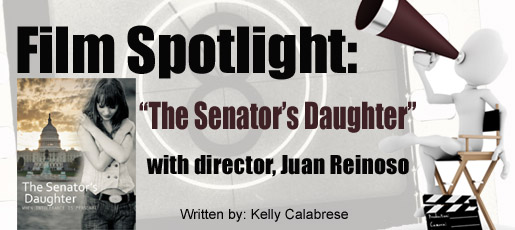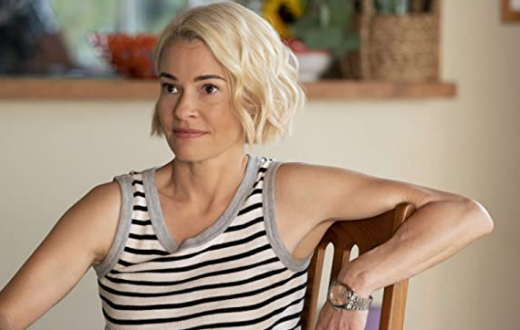Heh. I’m dryly laughing at myself because I have never been at a loss for words…until now. I mean really, when have you ever seen me not be able to write a proper intro?
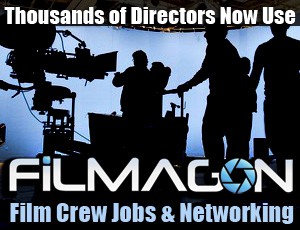 AARON GINSBURG, the Supervising Producer and one of the writers of the CW’s The 100 left me gasping for air and I still haven’t recovered!
AARON GINSBURG, the Supervising Producer and one of the writers of the CW’s The 100 left me gasping for air and I still haven’t recovered!
You are in for a special treat today with this interview. There are things in here that we, as actors, never get to learn about, never get to hear about and certainly never get to practice.
Everyone – this is one crazy ride as Aaron discusses personal things about himself, work and takes us behind-the-scenes of The 100!
I broke the interview into two sections: Questions About Aaron and Questions About The 100. If you’re a super fan of The 100, I challenge you not to skip ahead. 😉
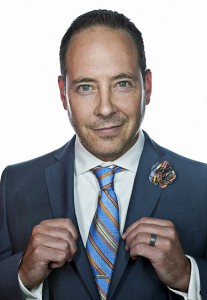
QUESTIONS ABOUT AARON:
At what point in your life did you realize you wanted to be in the entertainment field? How did you narrow down exactly what you wanted to do in the business?
I’ve always known I wanted to work in the arts. For many years, I wanted to be an actor, actually. When I was a kid, I was a member of a professional theater company and we would tour the US and Canada, performing plays (often times Shakespeare). I acted all the way up through college, but while I was getting my BFA, I discovered that I had a profound love for writing, directing and producing. And I slowly switched my focus over those years. What’s funny is, when I look back to my youth, I was always a writer and a director. When I was younger, and I’m talking little, I was already writing plays and books and producing complicated live shows. But, oddly, I didn’t realize how much writing was a part of who I was until I was in college and one of my professors said, “Maybe you’re not an actor… maybe you’re a writer.” Turns out, he was right.
How did your schooling work? You graduated High School and then what?
I went to undergrad at SMU where I studied theater (playwriting and directing) at the Meadows School of the Arts. It’s an amazing program. After that, I helped run an incredible theater company in Dallas for several years, directing and producing (more on that later). I also bummed around London for a bit writing theater reviews for a local newspaper and eventually moved to New York when I got a job the Lincoln Center. Then, right when I was getting settled in Manhattan, one of my screenplays got some heat and I was lured to Hollywood… Of course, by the time I’d uprooted my entire life and moved to LA, that deal had fallen through and I was back at square one… stuck in the land of the perpetual sun and palm trees.
Please tell us the difference between Executive Producer and Producer. What are the overall job functions and daily tasks of both?
This is always a tricky for question because there are so many definitions of these jobs and these titles. In the world of television, a show’s staff is made up of a bunch of writers — and these writers have different titles based upon their experience. On CW’s The 100, for example, I’m the “Supervising Producer.” This is because of my experience level — many of my duties are producorial — but I am also a writer on the show.
New writers on shows are known as “Staff Writers” and as they get promoted, their title changes (to “Story Editor,” “Executive Story Editor,” “Co-Producer,” “Producer,” “Consulting Producer,” “Supervising Producer,” “Co-Executive Producer” and finally “Executive Producer.”) On a writing staff, these titles represent the hierarchy of experience, but at the end of the day, all of these titles mean the same thing: we’re all writers.
Of course, making things only more confusing, the title of “Executive Producer” can also go to Line Producers, Directing Producers, actors in the show, and even the folks who helped sell an idea.
With your crazy schedule, how do you juggle family life?
As with everything, you make time. And some weeks, you balance it well, and other weeks, you’re completely buried with work and you’re just thankful that your wife lives all the way across the globe in the most remote inhabited part of the world. Oh, did I mention my wife lives in Perth, Australia? She does. She’s there for an amazing job, but it’s made your question of crazy scheduling even more crazy.
You did writing for the video game Call of Duty 2: Big Red One. Compare writing for a popular video game vs. a popular television series.
That was a number of years ago — My writing and producing partner, Wade McIntyre, and I wrote a few video games, actually. We wrote a whole article about this very question for Script Magazine (maybe I’ll post it soon to my tumblr, if people are interested). Wade and I have worked together for over a decade — writing everything from video games to Japanese game shows to reality shows to features to television. One thing is certain: it was a long, strange road to where I am now.
How does the paycheck work with people in your position? Specifically, if you’re a Producer and a Writer, or a Director and a Writer, do you get paid twice? Who negotiates your pay?
Agents (or managers) negotiate our salaries. That negotiation is different for everyone, of course, but basically Producers get paid per episode produced, and the writing fees are often separate. If you learn about a way to get paid twice, however, please notify me immediately.
As Producer and Writer, do you get residual checks?
We do get residuals, and they function very much in the same way as SAG and DGA (with minor differences depending on each union’s contract).
You did theater in your earlier days. What prompted you to make the move into television and/or film?
I love theater — and I still do theater whenever I can. In fact, I just recently finished directing a one-act play by Deirdre Mangan for an organization called SNAPSHOTS. The proceeds from the production went to Breast Cancer Research. The play just closed, but here are a few photos from the piece I directed.
And for the past ten years, I have directed a live show in LA called The Thrilling Adventure Hour at Largo at the Coronet. We sold out for a decade and have toured everywhere from San Francisco to New York to Australia and New Zealand. Here’s the website. The show is comprised of serialized stories (in the style of old timey radio) and we would do a new live-show every month with incredible actors (Paul F. Tompkins, Paget Brewster, Marc Evan Jackson, Busy Phillips, Josh Malina, Nathan Fillion, and many more…) for the past ten years. People can listen to past shows for free on iTunes.
And I am still a Core Company Member at Kitchen Dog Theater — which is based in Dallas, Texas. We are celebrating our 25th Anniversary this year as a company. So, if you’re in Dallas, check us out! I used to direct shows there every other year, but my TV writing schedule has become a bit too crazed. But I intend to go back as soon as I’m able.
Which is a long way of saying, I didn’t move into the TV and Film world, I just added those disciplines to my theater world.
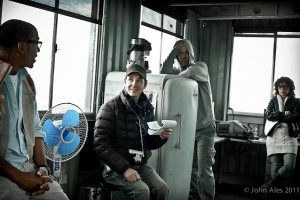
ON SET of BURN NOTICE: THE FALL OF SAM AXE
How did you get your agent at WME?
As I always tell people, you have to get the work before you get the agent.
I had been with a number of different agencies over the years — and none of them really clicked. The key to a good agent is someone who gets you and who you trust and like. I went through quite a few different agencies, but it was only when I was finally working consistently in TV that a few great guys from WME came to me.
What time do you wake up to go to work? Do you work on your days off? Is your head always spinning?
I am the insane combo of late-to-bed/early-to-rise. I stay up late, usually catching up on TV. But then I’m also an early riser — so I am usually up before the sun. I try to run 5 miles every morning, and then I dive into work. This means reading scripts, reading notes, watching cuts, giving notes, and —yes— even some actual writing. But I do my best work from 6am – 3pm. And yeah, I do work on most weekends.
What’s your daily routine?
I love my coffee. I drink about a pot or two a day. Hot, cold, who cares? And I tell you this without shame. The only things I drink, actually, are coffee (morning), water (day) and wine (evening). Does that count as a routine?
QUESTIONS ABOUT THE 100:
How did you get your job on The 100?
I interviewed with Jason Rothenberg, the creator. He had read samples of my work and knew my background and after our interview, he made me an offer to work on his show. I couldn’t have been more excited. I love the show and I still can’t believe how lucky I am do be a part of this incredible team.
As I mentioned before, I am a writer/producer (and my current title is “Supervising Producer”). So, I was hired to do both jobs from the outset. I have been writing and producing TV for quite a few years now, and I have had the great fortune of being able to move from job to job, show to show.
How exactly did YOU come to work on The 100?
This seems like same question as the previous one. I defer to question 12. [NOTE FROM ILANA: Readers, now you know where I took a break in coming up with questions for Aaron! Same wavelength. Always proofread before sending. I should follow my own rules!]
Who makes the decision to put so much space between airing seasons? Season Two began airing in October 2014 and ended March 11, 2015. How come Season Three isn’t airing until mid-season 2016?
Those decisions come from The CW, our network. As for the big time gap between Season 2 and Season 3 — the thinking was this: because The 100 is so serialized, it is incredibly hard to jump in on a random episode. You need to watch them all, in order, just like reading a good book. Netflix will release Season 2 in the fall (date TBD) and our DVDs (with bonus features, behind-the-scenes goodies, and a blooper reel) also comes out around that same time. The network is hoping new fans will find the show and binge on it over the holidays — allowing our incredible Season 3 to grow in viewership.
So if you love the show, spread the word!
Who came up with the ‘new’ character names and how were they chosen? Was character Lexa’s name chosen on purpose as a nod to Superman? (Clarke “Kent” / Lexa “Luthor”)
We take the naming of our characters very seriously. All names are chosen to create a feeling for the character or tell a deeper tale. Generally, the writer of the episode pitches a name for a new character and if Jason Rothenberg (the creator and showrunner) likes it, it stays. Sometimes the names will come up in the writers’ room as we are discussing the episode and they just stick.
Some characters take longer to name than others. For instance, “Nyko” took forever. He was named something else for a long time. I will not reveal what it was before — because it is truly absurd. It just didn’t SOUND like who Nyko was in our minds. So we kept trying names, looking for the best fit. And when we stumbled upon the name “Nyko,” we knew we had found it.
Many of the Grounder names are pulled from remnants of our old world, since destroyed by the bombs. There is a character in Season 2 that I named “Emori” — and her name came from the area where I imagine she was born, which is near the DC War Memorial. Her brother, “Otan”, was named after what was left of the Botanic Gardens.
Now, “Lexa” is a great name, right? Not related at all to Lex Luthor, but that’s all I will say about it.
The introduction of A.L.I.E., the female A.I., was a total shocker at the end of Season Two. At what point in time did the powers that be decide to go in this direction? Who came up with the A.I. idea and the struggle of Jaha and Murphy crossing the desert?
We knew we wanted to send Jaha (and Murphy) on a pilgrimage across the great desert early in the season. We planted the idea of the City of Light early on — in episode 204, I believe. We had a bunch of ideas of what they would find when they finally crossed the desert and reached the City of Light, and as we wrote the season, we kept pushing off locking down that decision. Eventually, we had to write the final two episodes and after much discussion and debate, Jason Rothenberg decided upon the AI reveal. But it was late by that point, it was in the final months of writing the season. We knew it was a big risk — because we didn’t really know at the time where this idea would take us…
But we are now deep into the writing of Season 3 and I can only tell you that the AI fits perfectly into our show and the story that comes with it will blow your minds.
From a technical stand point, what was everyone’s reaction when Alycia Debnam-Carey was cast on AMC’s Fear the Walking Dead?
After Alycia’s first episode in Season 2, we knew fans were going to love her. She is so incredibly charismatic and the mythology surrounding the Commander is just too juicy. We knew we wanted to tell big stories with her — and we have thankfully been able to do that.
We were absolutely thrilled to hear Alycia got cast in “Fear The Walking Dead.” She is such a delight to work with, she’s so kind and smart and hard working. We want all the best for her. And we had discussed ways of telling the story if we never got to use her again. It would have been cool, but, I won’t lie, we were beyond thrilled that we were able to work out a way for Lexa to return to the world of The 100.
Get ready… It’s going to be so good.
Why is the title pronounced ‘The Hundred’ instead of ‘The One Hundred’?
“The Hundred” is the correct pronunciation. The series was based upon the book by Kass Morgan — and she had originally titled it “The Hundred.”
When the marketing team at CW started creating logos for the show, however, the number version — “The 100” — just looked better on the posters, graphically speaking. But even though the logo has changed, the show is still pronounced “The Hundred.”
Who invented the Grounders language Trigedasleng? Does someone help the actors pronounce the words or they just figure it out on their own?
Trigedasleng was created by linguist David Peterson, the man behind the Game of Thrones languages (among many others). You can check out his tumblr here. We write the scripts in English and then send them to David and he translates them. He also records audio files with the correct pronunciation of each sentence and we forward those to the actors.
As any of our actors will tell you, memorizing Trigedasleng is very, very challenging.
Who decides just how much you and the actors are allowed to talk about regarding spoilers.
We hate spoilers at The 100. We want our fans to be surprised and shocked and moved, so we really try to keep a lid on things. All of the primary cast knows how hard we work to keep plot twists and surprises… well, plot twists and surprises. It is made explicitly clear that while on set no one is to tweet about, Instagram, Vine, Periscope, any aspect of the show. And no, you may not add Commander Lexa to your professional network on LinkedIn.
In instances where you don’t want the script leaked, you rip out those pages. How many people actually KNOW what’s on that ripped out script page?
Yes, with Finn in Season 2, we did not publish the last page of that script. We kept who knew what was going to happen to the bare minimum.
Please outline your typical day on set of The 100.
There is no “typical” day on set of The 100.
Every day is an adventure, and every day is a challenge. We really are striving to make something incredible here, and we always push ourselves to make it better and better and better. The days generally begin with a long drive to set (around an hour) — though set could be built on one of our sound stages or it could be out in the Vancouver wilderness.
Once everyone has arrived at call, the director, actors, writer/producer and the first AD will rehearse the scene until they feel like they’ve found the best shape. Then the DP and the crew will watch a rehearsal to get a sense of where to light and what additional stage dressing needs to be added. Once we are lit and ready to go, we rehearse once more (with cameras) and then start shooting.
As many of your readers know, we shoot each scene many times from different angles and from different sizes. The actors have to match their performance throughout. Scenes vary in how long they take to film — depending on how long the scene is or how complicated it is — for instance, does it have a Grounder hacking someone’s head off with an axe? If the answer is yes, expect that scene to take longer. Axes, blood, stunt doubles, open wounds, horses, green screens — all that stuff adds time to the day. You get the idea.
We generally shoot three to four scenes in a day — and our days average about 13 hours (plus the two hours of commute time). Tiring, but always exciting!
Who has the final say in which actors are cast? Take us through the process. Who hires the Casting Director. What is the CDs job?
The creator/executive producers hire the casting director. Right now, we work with two amazing CDs — one in LA for all LA hires, and one in Vancouver for the roles we cast out of Canada. Their job is what you’d expect — we send them the list of characters we have coming down the line (they also get the scripts). They read and brainstorm actors they believe would be interesting choices for the role. They also get agent submissions (depending on how high profile the role is). Then they bring in a bunch of actors and audition them — putting the performances on tape. I have no idea how many people they audition for each role because they narrow their selection down to the top “selects.” These are the people that popped and the CDs will often give us a variety of different takes on each character. Then we, the producers, watch the “Selects” and pick our favorite for the role. Once we have made our choice, we have to submit the actor to the Studio and the Network for approval. The bigger the role, the more the actor is scrutinized. We have definitely picked an actor for a role who then didn’t get approved by the powers-that-be. It happens. In those instances, we can fight for our original pick or choose another option.
What are auditions like for The 100?
I have not been to an audition because these days we do it all on tape. Gone are the days when the writer would sit in the room with the actors. I miss those days, actually.
These days, the CDs will record the actors in their offices and post them to a password protected website. The writers and director will watch the auditions on our computers (or even on our iPhones while riding in a production van) and discuss which actor feels like the best fit. Often, the sides we give the actors to audition with are fake — to prevent spoilers or actual twists.
In The 100, how far in advance are episodes discussed vs. actually written on paper and distributed? Once the script is on paper, who sees it first, second, etc? Do the scripts have to be approved by the network first before it can be given to the actors?
To give you an example, it is the end of August as I’m answering this, and we are currently coming up with the story of episode 308 — which doesn’t shoot until mid-October. We try to stay a few scripts ahead of filming, but that is sometimes a challenge.
Once the script is on paper, we have to send it to many people before the actors see it — executives at the Studio, executives at the Network (they often give us excellent notes and we then have to do rewrites). After that, our Line Producer and Directing Producer read it and we discuss the cost and whether or not we can even produce it within our show’s budget. More rewrites happen here. Then the department heads get the script (Costumes, Hair and Make Up, Set Designer, et al) so they can start working on their contributions. Then the actors get the scripts. That generally happens a few days before filming begins…
Have you changed scripts and premises based on fan reaction?
No. We never change scripts based on fan reaction. We love our fans — they are the most passionate and dedicated group I’ve ever encountered. That said, we are often writing so far in advance, the story is already figured out before any of the episodes air. We hope that our fans trust us to give them the most powerful and emotional and exciting season each year.
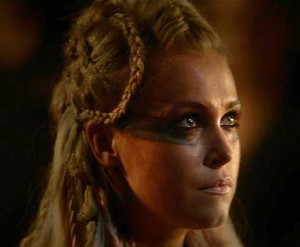
What is a ‘writing assignment series’? How are the writers chosen?
On our show, we have a staff of amazing writers and we will decide which writers will write each episode internally. We don’t have any “writing assignments.”
Main character Clarke is bisexual and it isn’t a big deal. At what point was this discussed with actress Eliza Taylor or did she find out the same time everyone else did when she read the script?
It was discussed beforehand. Eliza is amazing. In The 100, we are really striving to create a brave new world where sexual orientation and nationality (skin color, ethnic background, et al) are no longer hot-button issues. The nuclear holocaust changed the world and the survivors are all just humans trying to make it through another day. You are who you are, you love who you love. No judgements. It’s too dangerous of a world out there to worry about things like this.
What about Lexa, played by Alycia Debnam-Carey? Was her sexuality already defined when the casting call went out? Did Alycia go into this already knowing her character liked women?
We had discussed Lexa’s sexuality early — though it wasn’t listed as part of her audition/character breakdown… because, again, it is not really important. Her sexuality does not define her — she is far more than that. In our minds, Lexa is this epic leader, this forward thinker, and this passionate (but calculating) warrior.
Do you aim to please the fans or the fans have no affect on the storyline? Example: How are you going to please both the Clexa fans and Bellarke fans?
Again, we love our fans. We do. And we absolutely feel the same chemistry between certain pairs of actors. That’s real — if you feel it, we feel it, too. But that said, we have a story we want to tell with these characters. And we spend hours and hours and hours every week debating and discussing and brainstorming to find the most incredible way to tell our story. We don’t make decisions based on what fans might want (or don’t want) (or think they want). We make decisions on what is best for the story… On what the characters would really do when faced with these situations. It should be noted, that we love our characters (and the actors who bring these roles to life), and if our fans go along for the ride, I assure you, they will not be disappointed.
Who came up with the Grounders eye/face make-up? Was there a sketch? Did it have to be approved by someone or was it left up to the make-up crew and whatever they came up with is what it is?
The Grounder make-up is painstakingly designed by our incredible Make-Up genius, Tanya Howard, and her team. For Lexa’s iconic war make-up, Tanya did a huge number of demos on Alycia and sent each option to Jason Rothenberg for approval. It took hours, with dozens of different variants, until he saw the version he loved. It’s incredible how iconic that look has become. Our crew is so incredible — every department — and they all work so hard to make the world of The 100 feel so fully realized.
Exclusive Photo to NYCastings of Aaron Ginsburg in his The 100 office.
For television and film, who writes the daily news releases / press releases?
Not me. Phew!
Please follow me on Twitter: @LizardLadyNJ and also remember to follow @NYCastings for the latest New York casting notices, contests and blogs! You can email me at ilanarapp@gmail.com with any questions or ideas you’d like to see in future articles.

